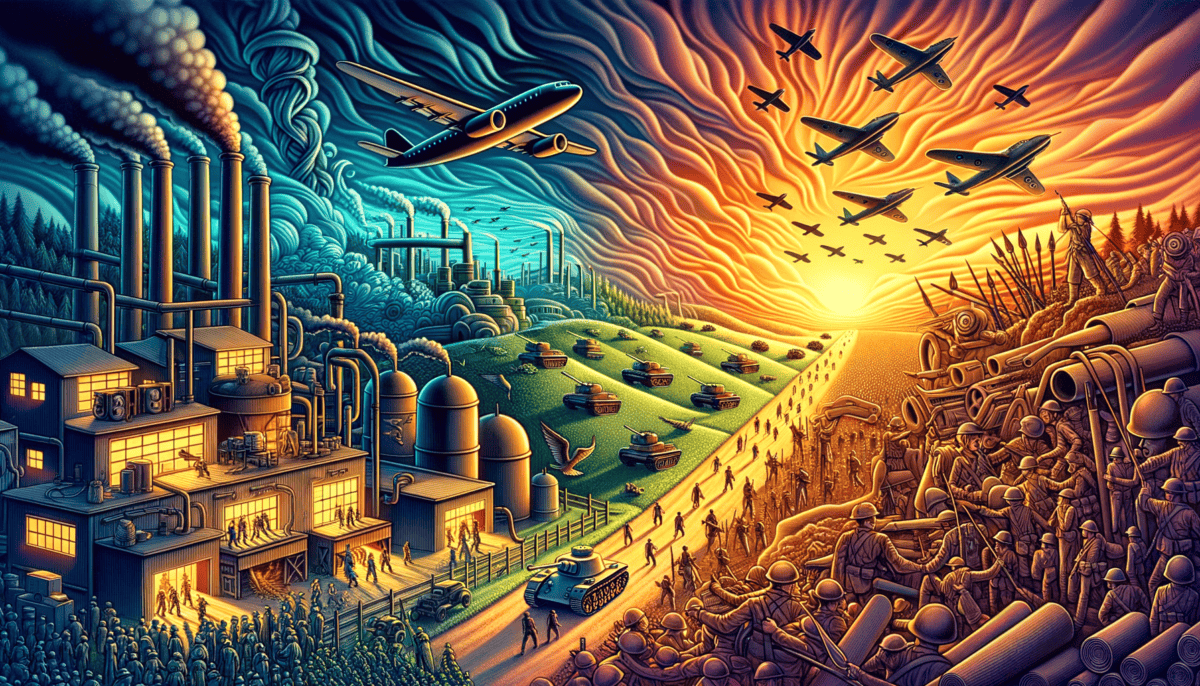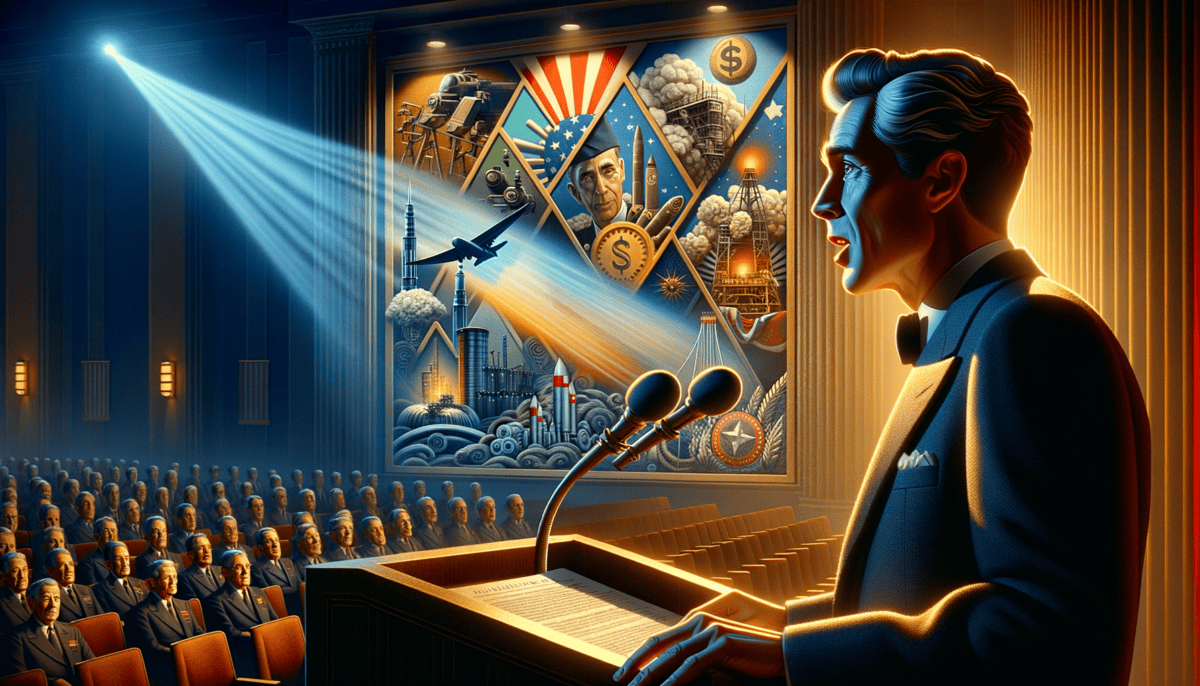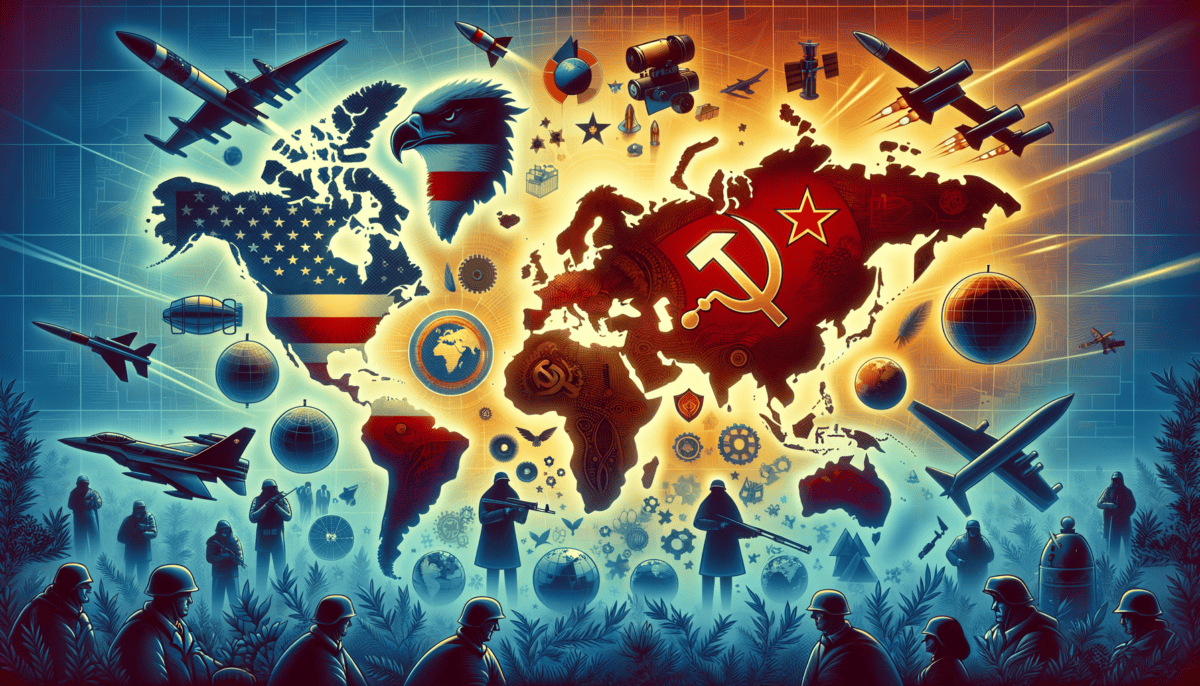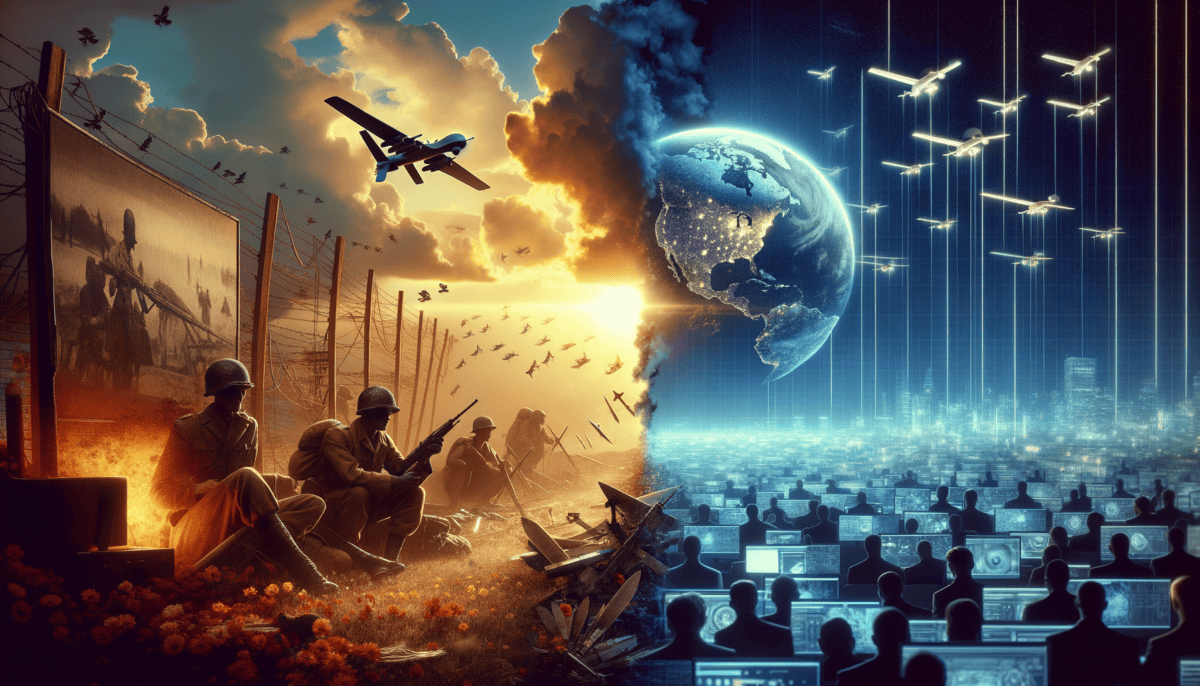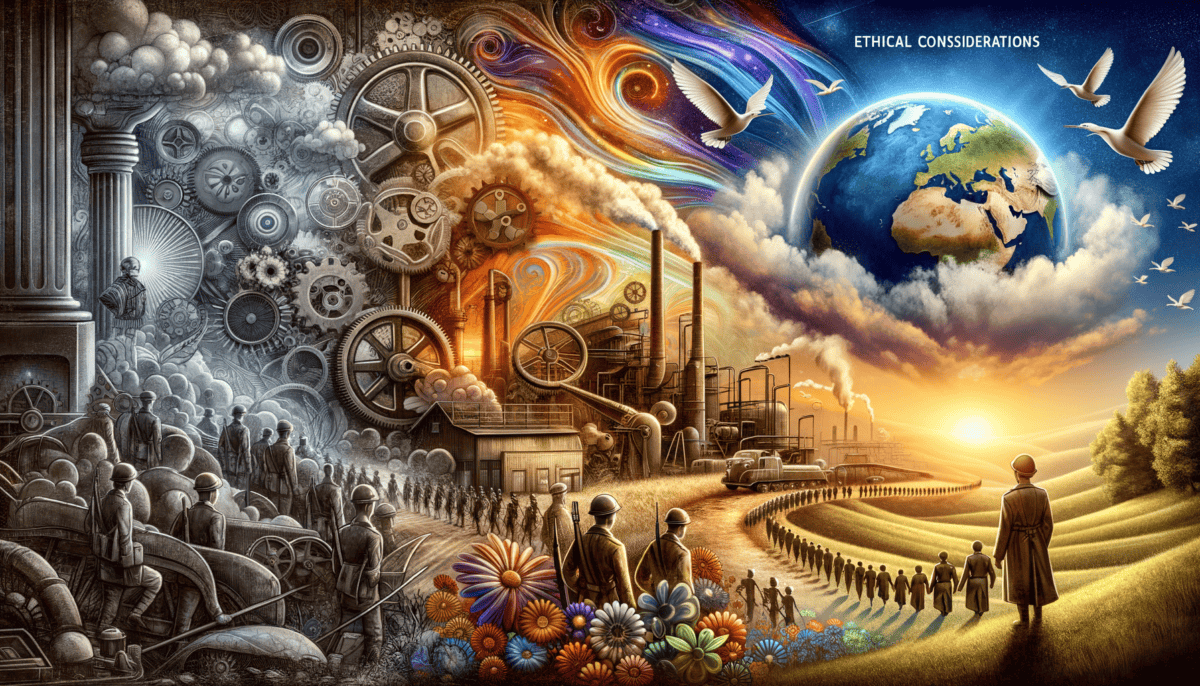The Seeds of War
Tommy sat at his grandfather's workbench, eyes wide with wonder as his hands traced the smooth metal of an old factory whistle. The year was 1899, and the world was about to change forever.
"You see this whistle, Tommy?" Grandpa Joe's weathered hands picked up the brass instrument. "It called a thousand workers to the steel mill every morning. But now, it calls them to make something different."
"What do they make now, Grandpa?" Tommy's curiosity sparkled in his bright eyes.
"They make the tools that armies need. Big ships, strong guns, and mighty machines." Grandpa Joe's voice grew serious. "Everything changed when the big companies saw how much money they could make from war."
Tommy watched as his grandfather pulled out an old newspaper. The headlines shouted about new inventions – airplanes, submarines, and powerful new weapons. Companies that once made plowshares were now making swords.
"Let me tell you about three big changes that happened," Grandpa Joe said, holding up his fingers to count:
• Factories stopped making regular things and started making weapons
• Rich people saw they could make more money from war supplies
• Governments started spending lots of money on new fighting machines
"But why did they change, Grandpa?" Tommy asked, his forehead wrinkled in confusion.
"Money, my boy. Simple as that." Grandpa Joe picked up a penny from his workbench. "The companies found out they could make more pennies like this one by selling to armies than by selling to farmers."
The New Factory World
Tommy followed his grandfather to the window. Below, they could see the massive factory where Grandpa Joe worked. Smoke billowed from tall chimneys, and the sound of hammering filled the air.
"When I first started working," Grandpa Joe explained, "we made railroad parts. Now look." He pointed to a large ship hull taking shape in the yard. "That's a battleship being born."
Tommy watched as workers scurried around the massive hull like ants. In the distance, more factories were sprouting up – each one ready to join the race for military contracts.
"But isn't war bad, Grandpa?"
"Yes, Tommy. War is very bad. But some people forget that when they see all the money they can make."
The New Leaders
Grandpa Joe pulled out his photo album, pointing to pictures of men in fancy suits. "These are the new factory owners. They used to make simple things – cars, farm tools, even toys. Now they make the machines of war."
A thunderous boom made Tommy jump. In the factory yard, workers were testing a new cannon. The sound echoed off the hills, making the workshop windows rattle.
"That's the sound of change, Tommy. The sound of the future." Grandpa Joe's voice was soft but worried. "Some say this is progress, but I wonder…"
Tommy picked up the old factory whistle again, its brass surface reflecting the setting sun. In its gleam, he could see the world changing – factories growing bigger, weapons getting stronger, and money flowing like rivers into new hands.
The old clock on the wall struck six, and Grandpa Joe stood up with a groan. "Time for my night shift, Tommy. Remember what you learned today. Sometimes the biggest changes in the world start with simple choices – like what a factory decides to make."
As Tommy watched his grandfather walk toward the factory gates, the old whistle still in his hands, he wondered what other changes this new world of military manufacturing would bring. The sun set behind the smokestacks, casting long shadows across the yard where tomorrow's weapons were taking shape.
The factory whistle blew, calling the night shift to work, its sound echoing across a world that would never be quite the same again.
The Great War Machine
Tommy stood beside his grandfather at the factory gates in 1917. The old brass whistle that once called workers to make train parts now summoned them to build machines of war. The world had changed, just as Grandpa Joe had predicted.
“Look there, Tommy,” Grandpa Joe pointed to the massive new buildings that had sprung up. “Remember when this was just one small factory? Now look at it!”
Tommy’s eyes widened at the sight. Where once stood a simple steel mill, now stretched a huge complex of buildings. Trucks rumbled in and out, carrying parts for tanks, planes, and ships.
The Big Switch
“But where do they make cars now, Grandpa?” Tommy asked, remembering how the factory used to build automobiles.
“That’s the thing, boy. These big companies learned a trick during the wars. They can change what they make very quickly!” Grandpa Joe pulled out his notebook and showed Tommy some simple drawings:
• Car factories became tank factories
• Toy makers started making bullets
• Cloth mills began making uniforms
• Ship builders made warships
• Airplane makers built fighter planes
New Companies Rise Up
Tommy noticed new names on the factory buildings. “Who are they, Grandpa?”
“Those are the new defense contractors, Tommy. Big companies that make things just for war. They grew very powerful during these wars.”
A loud roar filled the air as a new airplane took off from the testing field. It was sleeker and faster than anything Tommy had ever seen.
Science Gets Bigger
“Come see this, Tommy.” Grandpa Joe led him to a new building with many windows. Inside, men and women in white coats worked at desks and strange machines.
“This is where they do research. The wars made people create new things very quickly. Radar to see far away, better radio sets, and even medicine to help hurt soldiers.”
“Is that good?” Tommy asked.
“Some of it helps people, like the new medicines. But some of it…” Grandpa Joe’s voice trailed off as another test plane roared overhead.
A New Kind of World
“The world’s different now, Tommy,” Grandpa Joe said, watching workers stream into the factory. “Countries spend more money on weapons than ever before. They say it keeps us safe.”
Tommy looked at the old brass whistle he still kept. “Remember when this just called people to make simple things?”
Grandpa Joe nodded. “Those days are gone. Now the whistle calls people to build things that can change the whole world – for good or bad.”
The sun was setting behind the factory buildings, casting long shadows across the yard. The evening whistle blew, its sound different now – louder, more urgent. It was calling workers to build tomorrow’s weapons, just as it had called their fathers to build yesterday’s tools.
Tommy clutched his grandfather’s hand as they walked home. The world had changed so much since that first day at the workbench. And it wasn’t done changing yet.
The General’s Warning
Sarah sat in her grandpa’s study, looking at old black and white photos. One picture showed a man with a kind face and no hair. He wore a military uniform with lots of stars.
“Who’s that, Grandpa?” Sarah asked, pointing to the photo.
“That’s President Eisenhower, sweetheart. He was first a great general, then became our president. And he had something very important to tell everyone.”
The General Who Knew Too Much
“You see, Sarah,” Grandpa explained, “Eisenhower knew all about war. He led our soldiers in World War II. But he saw something that worried him.”
“What worried him, Grandpa?”
“He saw how companies that made weapons were getting very close to people who made decisions about war. It reminded him of a big puzzle that didn’t quite fit right.”
A Special Speech
Grandpa pulled out an old TV recording. Sarah watched as the kind-faced man spoke to America. His voice was soft but serious.
“He called it the ‘military-industrial complex,'” Grandpa explained. “That’s a big name for something simple: when weapon makers and the army get too close together.”
Why People Worried
Sarah watched as her grandpa showed her more pictures. “Look at these factories, Sarah. They grew bigger and bigger. Some towns only had weapon factories for jobs.”
“But isn’t making things for our soldiers good?” Sarah asked.
“Yes, honey. But President Eisenhower worried that we might make more weapons than we need, just because people could make money from them.”
People React
Some people listened to Eisenhower’s warning. Others didn’t think it was important. But his words stayed with many people.
“It’s like when Mom says to be careful about eating too many cookies,” Sarah said thoughtfully. “Even good things need limits?”
Grandpa smiled. “That’s exactly right, sweetie.”
• Be careful about who makes big war decisions
• Don’t let money be the only reason for making weapons
• Remember to spend money on schools and roads too
• Keep power balanced between different groups
Looking Forward
Sarah looked at the photo of Eisenhower again. “Was he right to worry, Grandpa?”
“Many people think he was very wise, Sarah. His warning helps us think carefully about big decisions even today.”
Outside, the sun was setting. Sarah could see the lights of the big factory in the distance, still making things for the military, just as it had in Eisenhower’s time.
“Remember what President Eisenhower taught us,” Grandpa said softly. “Sometimes the bravest thing is to speak up when you see something that doesn’t seem right.”
Sarah nodded, understanding that sometimes the most important lessons come from people who have seen both sides of a story – just like the general who became president and tried to warn us all.
Racing to the Stars
Tommy sat at his desk, staring at a model rocket his dad had helped him build. On TV, news about America and the Soviet Union filled the screen.
“Dad, why are they talking about rockets so much?” Tommy asked.
“Well, son, we’re in what they call a ‘Space Race.’ It’s like a big contest between us and the Soviet Union to see who can build better rockets and reach space first.”
The Big Race Begins
Dad pulled out a newspaper showing two giant rockets. “See these? Both countries spent lots of money making bigger and better machines. We wanted to be the first to reach the moon!”
“Did we win, Dad?”
“Yes, but it wasn’t just about space. We were also making other things – computers, planes, and new materials that changed how we live.”
New Ideas, New Tools
Tommy’s dad showed him pictures of new inventions. “Many things we use today came from this time. Like the computer mouse, and special clothes that keep you warm.”
“Even my light-up sneakers?” Tommy asked excitedly.
“Something like that! Companies that made things for the military started making things for everyone too.”
A World of Change
Tommy looked at pictures of giant factories and laboratories. Scientists in white coats worked on shiny machines.
“The whole world was changing,” Dad explained. “Cities grew bigger because of these new jobs. Some towns became famous for making special parts for rockets or planes.”
Money and Machines
“It cost a lot of money to make all these new things,” Dad continued. “The government spent more money on military stuff than ever before.”
“Where did all the money come from?” Tommy wondered.
“From taxes – money that grown-ups pay to help run the country. Some people worried we were spending too much on military things instead of schools and parks.”
• More jobs in science and technology
• Bigger cities with new factories
• New inventions we still use today
• More money spent on military things
Playing Both Sides
Tommy noticed something interesting in the pictures. “Dad, these companies make stuff for space AND for war?”
“That’s right. The same company might make parts for rockets going to space and missiles for the military. It was all connected.”
Looking to Tomorrow
Tommy picked up his model rocket again. “I want to build real rockets someday, Dad. But not for war – for exploring space!”
Dad smiled. “That’s good thinking, son. The best part of all this change was learning how to make amazing new things. We just have to be careful about how we use them.”
Outside, an airplane flew overhead. Tommy watched it disappear into the clouds, wondering what new adventures tomorrow might bring.
Dad put his hand on Tommy’s shoulder. “Remember, the most important race isn’t about who has the biggest rockets or strongest weapons. It’s about making the world better for everyone.”
A New Kind of War
Sarah sat in her classroom, watching a video about modern soldiers. They looked different from the old pictures in her history books.
“Why do their helmets have special screens?” she asked her teacher, Ms. Rodriguez.
“That’s because war has changed a lot,” Ms. Rodriguez explained. “Today’s soldiers use computers and special technology to do their jobs.”
Computers Change Everything
“Remember how we use computers to play games?” Ms. Rodriguez asked the class. “Well, soldiers use similar technology to train and work.”
Jimmy raised his hand. “Like video game controllers?”
“Exactly! Some soldiers even control flying robots called drones using special controllers.”
Private Helpers
Ms. Rodriguez showed pictures of people in business suits working with soldiers. “These are people from private companies. They help make and fix the special equipment.”
“Like my mom!” Sarah said proudly. “She works at a company that makes special computers.”
Around the World
The class looked at a big world map. Ms. Rodriguez pointed to different countries. “Today, many countries work together to make military equipment.”
“One country might make the computer parts, another makes the special metal, and others put everything together.”
• Smart technology in everything
• Private companies helping more
• Countries working together
• New ways of keeping peace
Digital Defenders
“But not all soldiers carry guns anymore,” Ms. Rodriguez explained. “Some fight bad guys on computers.”
“Like superhero hackers?” Billy asked excitedly.
“Sort of! They protect important computer systems and information. It’s called cyber warfare.”
Safety First
Ms. Rodriguez showed pictures of soldiers helping during natural disasters. “Modern military isn’t just about fighting. They help people after storms and earthquakes too.”
“Their special equipment helps them find people who need help!” Sarah noticed.
Working Together
The class worked on drawing pictures of future soldiers. Some drew flying suits, others drew underwater bases.
“The most important thing,” Ms. Rodriguez said, “is that all this new technology should help keep people safe and make the world more peaceful.”
Sarah looked at her drawing of a soldier using a computer to plant trees. She smiled, thinking about how technology could help make the world better.
As the bell rang, Ms. Rodriguez reminded them, “Remember, the best technology is the kind that brings people together and helps them understand each other better.”
Making Tomorrow Better
The sun was setting as Sarah and her classmates gathered for their final project presentation. They had spent weeks learning about how the military and big companies work together. Now it was time to share their ideas about the future.
Smart Ideas for Peace
“What if we used military technology to help the Earth?” Sarah stood at the front of the class, holding up her colorful poster.
Ms. Rodriguez smiled. “That’s a wonderful thought, Sarah. How would that work?”
“Well, those special cameras that watch for danger could watch for forest fires instead. And the big planes could drop water on the fires!”
• Cleaning the oceans
• Finding lost people
• Helping after storms
• Growing more food
Working Together for Good
Jimmy raised his hand excitedly. “My dad says lots of countries are starting to share their good ideas!”
“That’s right,” Ms. Rodriguez nodded. “When countries work together instead of fighting, everyone wins.”
New Ways to Keep Peace
Billy showed his project next. He had built a little robot from recycled materials. “This robot could help clean up plastic from the ocean!”
“And look,” he demonstrated, “it runs on sun power, just like some military equipment does now!”
Helping People First
The class created a big mural showing their hopes for the future. They drew pictures of:
• Soldiers planting trees with special tools
• Flying hospitals helping sick people
• Underwater cities cleaning the seas
• Space stations watching for asteroids ⭐
The Final Project
“You’ve all shown such wonderful ideas,” Ms. Rodriguez beamed. “The future isn’t just about having the strongest weapons. It’s about being strong enough to help others.”
Looking Forward
As Sarah packed up her project, she thought about everything she had learned. The military wasn’t just about tanks and planes anymore. It was about finding new ways to make the world better.
“Ms. Rodriguez,” Sarah asked, “do you think when I grow up, I could help make technology that saves people?”
“Of course you can, Sarah! That’s exactly what the world needs – people who want to use their smarts to help others.”
The classroom buzzed with excitement as students shared more ideas. They all knew now that the biggest victories don’t come from fighting – they come from working together to solve problems and help people everywhere.
As the final bell rang, Sarah smiled at her classmates. She couldn’t wait to grow up and help make their bright ideas come true. The future was full of possibilities, and they were ready to make it wonderful.


